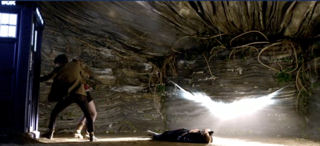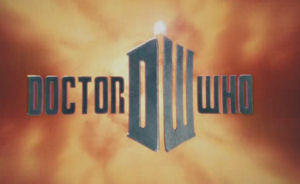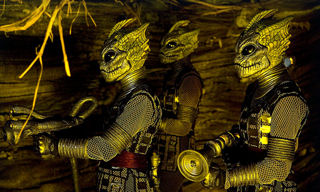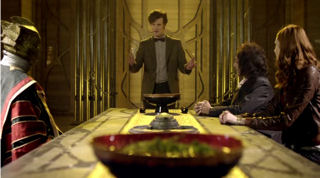“Cold
Blood” is more fun than “The
Hungry Earth,” if only because we finally get
down into the Silurian city and spend most of our time there.
It doesn’t look entirely real, but then again it isn’t;
it’s a hollowed-out environment as artificial as anything
we’ve built for ourselves aboveground. It’s
also pretty sumptuous in parts; turns out the Silurians
are good with hydroponics and almost-Art-Deco interior design.
Even
the makeup doesn’t bother me at all now that I’m
used to it. I love the masks, the guns, the clothes, the
head crests — major props to the designers. With the
sound down, this could be my favorite episode this season.
However,
once you click off Mute, you’ve got problems. I guess
they’re the sort of problems you could ignore if your
expectations were low enough. For example, my expectations
for “Vampires
In/Of/Around Venice” were very low, so they were
easy to meet. I expected silly and corny and that’s
pretty much what I got; it’s not an episode I’ll
go back and watch over and over. The return of the Silurians,
though, had me hoping for a classic.
This
episode starts with a voiceover by someone we haven’t
met yet, in exactly the same way that “The
End of Time” did, and the result is almost as
cheesy. The voiceover comes back later on at exactly the
wrong moment, ripping us out of the story so that Chibnall
can deliver information he couldn’t figure out how
to present dramatically. Maybe he just didn’t have
time — to its credit, the story doesn’t drag
a whole lot, though some of the action scenes seem to repeat
themselves with diminishing effect.
Then
we begin to meet some other Silurians, though not as many
as you might expect, and it’s a little puzzling that
a dire threat to the survival of their race didn’t
result in waking up a lot more of them from hibernation.
We also find that the females are without exception the
aggressors, while the males are without exception pacifists.
I hope
this is based on some sex-linked behavior traits in reptiles
(I don’t know offhand), because otherwise I have to
assume it’s just a glib “role reversal”
gimmick to avoid appearing sexist. Is it more sexist to
portray women as weak and conciliatory, or to portray them
as rabid killers? Maybe Chibnall should just have avoided
the problem altogether by mixing it up a little.
The
Doctor says “I (rather) love you” for the first
time in this episode, as far as I know. He says it not to
Amy or Rory or his sonic screwdriver (and can I tell you
how sick I am of seeing him wave that thing EVERYWHERE?
my Doctor is cricket balls and yo-yos, not omnipotent magic
wands) but to a Silurian scientist.
As far
as I could tell, the reason for this effusiveness was that
the scientist had just explained that although he kidnaps
humans against their will and holds them captive and dissects
them and causes them intense pain, he doesn’t actually
HURT them. He just wants to help, in some vague way I’m
not sure I understood. This is an example of the way this
episode addresses moral issues.
Then
there’s the way Alaya, the captive Silurian on the
surface, is treated. What happens to her is (clumsily) presented
as an accident, presumably because we’re too immature
to deal with the moral complexity of understanding and forgiving
(or not) someone with a tragic flaw.
Unfortunately,
this doesn’t allow the accident, and by extension
the entire story, to mean much of anything. This moment,
and the decisions and actions leading to it, should be the
moral and dramatic center of the story, but instead it’s
just an engine to drive us to an action-packed climax. In
fact, this accident is almost the smartest thing to do,
because it really does postpone a probably-fatal encounter
between humans and Silurians, and doesn’t seem to
ignite the all-out war Alaya was hoping for (since the pacifists
barely seem to care).
After you’ve seen the episode, you
can join me in wondering why the Silurians didn’t
just go up to the surface and stop the drill themselves?
And why they would have a tongue that stings people and
causes “genetic contamination” as opposed to
just poisoning them? And how “Homo reptilia”
can be considered more proper than “Silurian,”
since Reptilia is a class name, not a species name? “Homo
reptilia” would only make sense if the Silurians and
humans had a common primate ancestor. (It’s an interesting,
overcomplicated idea, perhaps related to the aforementioned
“genetic contamination,” but almost certainly
not what the Doctor or the author were trying to suggest.)
 |
The Doctor’s “probably worth
mentioning” line was very funny and perfectly delivered.
Amy’s comedy lines, though, just about all of them:
not funny, not especially well delivered. She’s becoming
Rose circa “Tooth and Claw,” laughing at stuff
we have to take seriously for the drama to work, and that’s
not good. Unfortunately even the ending can’t sober
her up because she won’t remember it.
At least I can say I’m glad I was
mistaken about Elliott’s role in the story, though
a little disappointed that he really has none. That moment
with Amy and Rory waving from the hill, though not explained,
is at least significant in terms of advancing the season
arc, and the discovery the Doctor makes about the Time Cracks
at the very end is intriguing (maybe you saw it coming,
but I didn’t).
And to be honest, as hamfisted as this was
in terms of themes, characters, and plot, I’d still
happily rewatch it. Perhaps I just love lizard people too
much. And given how much they must have spent on the sets,
costumes, props, and makeup, I wouldn’t be at all
surprised to see a followup next season.









